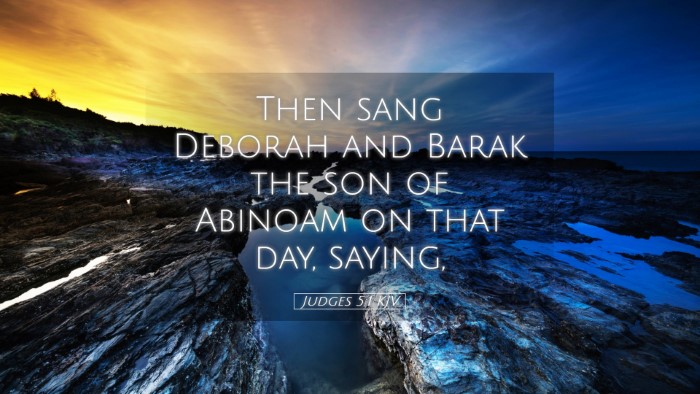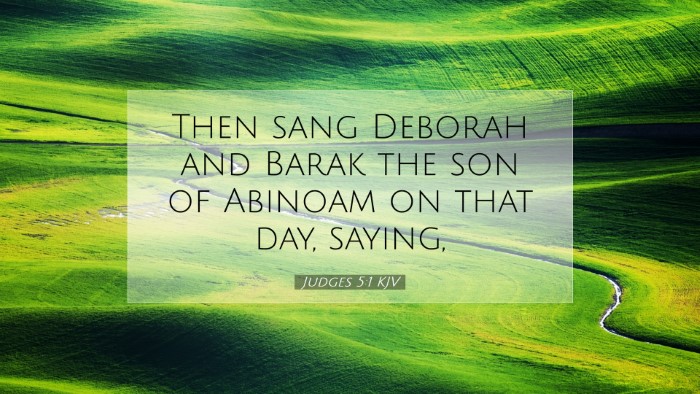Commentary on Judges 5:1
Verse Text: "Then sang Deborah and Barak the son of Abinoam on that day, saying," (Judges 5:1, NKJV)
Introduction
The song of Deborah and Barak in Judges 5 presents a significant moment in Israel's history, highlighting themes of victory, divine intervention, and the roles of women in leadership. It serves as both a celebration of triumph and an exhortation to remember God's faithfulness.
Context of the Chapter
This chapter, which follows the historical events recounted in Judges 4, encapsulates the victory over Sisera and the Canaanites. Deborah, a prophetess and judge, alongside Barak, demonstrates God's power in delivering Israel from oppression.
Exegesis of Judges 5:1
1. Historical Context: The song is rooted in the aftermath of a great battle. Scholars note that it captures a communal memory important for Israel's identity.
2. Role of Deborah: Matthew Henry emphasizes the importance of Deborah as a leader in a predominantly male-oriented society, showcasing God's use of women in pivotal roles. Her prophetic ability underscores her authority and the recognition of her leadership by Barak.
3. The Significance of Song: Albert Barnes notes that singing in the Hebrew culture often accompanied significant events. This song serves as a historical record and provides theological reflections on God's deliverance. It is not merely a celebration but also a reminder of the covenant relationship between God and Israel.
Commentary Insights
This section aims to distill insights from various commentaries regarding Judges 5:1:
-
Matthew Henry: He emphasizes the unity of Deborah and Barak in leadership, indicating that the song reflects their partnership in the deliverance of Israel. The balance between their contributions highlights the collaborative nature of God’s work through human instruments.
-
Albert Barnes: He notes the significance of the phrase "on that day," suggesting that it marks a pivotal historical moment. The immediacy of the celebration is contrasted with the long-term implications for the Israelites, reminding them of God's deeds.
-
Adam Clarke: Clarke explores the poetic structure of the song, indicating that its form enhances its memorability. He views the song as a theological reflection on God’s attributes—power, faithfulness, and justice—especially in delivering the weak from the powerful.
Theological Implications
This verse opens a window for understanding the attributes of God as presented through historical acts:
- God's Sovereignty: The victory over Sisera was not due to military might but divine intervention, affirming the sovereignty of God in Israel's affairs.
- Community Response: The act of singing reflects a community engaged in worship and recognition of God's works, embodying a collective response to divine goodness.
- Role of Women: Deborah’s leadership challenges societal norms and emphasizes that God equips and calls leaders from all backgrounds.
Application for Today
The song of Deborah and Barak speaks to contemporary audiences in profound ways:
- Celebrating God's Deliverance: Today's believers are called to recognize and celebrate the ways God has intervened in their lives, fostering a culture of thanksgiving.
- Encouraging Leadership Diversity: The story encourages the affirmation of diverse leaders in the church, reflecting the breadth of God’s gifts among His people.
- Fostering Community Worship: The communal act of worship through song remains vital, serving as a unifying force that recalls the history and faithfulness of God.
Conclusion
Judges 5:1 stands not just as a record of historical triumph but as an invitation to understand God's character and faithfulness. The song encapsulates the essence of worship that recalls God's mighty acts, encouraging faith and unity among His people. For pastors, students, theologians, and Bible scholars, the themes embedded in this verse invite both reflection and action as they lead communities towards a deeper understanding and celebration of God’s ongoing work.


